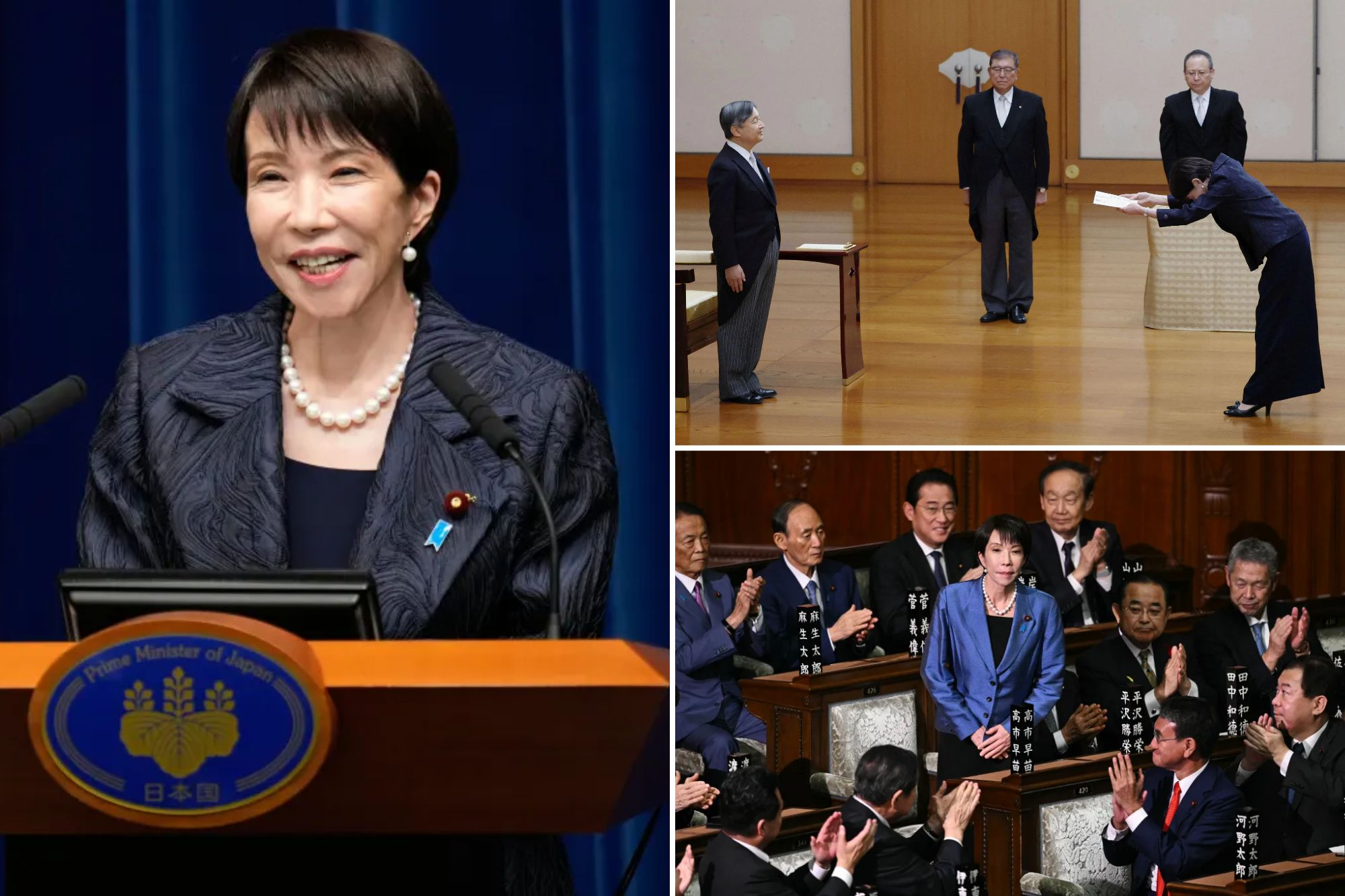World
Japan Elects Sanae Takaichi as First Female Prime Minister

Japan’s parliament has elected ultraconservative Sanae Takaichi as the country’s first female prime minister, marking a significant milestone in its political history. The election took place on March 15, 2024, following a coalition agreement between Takaichi’s Liberal Democratic Party (LDP) and the Osaka-based Japan Innovation Party, which is expected to shift the governing bloc further to the right. Takaichi succeeds Shigeru Ishiba, who resigned earlier that day after a year in office, ending a three-month political vacuum caused by the LDP’s disappointing election performance in July 2023.
In a decisive vote in the lower house of parliament, Takaichi secured 237 votes, surpassing the majority threshold, while opposition leader Yoshikoko Noda received 149 votes. As the results were announced, Takaichi expressed her gratitude with a deep bow, symbolizing a momentous occasion in a nation where male leaders have traditionally dominated the political landscape.
Mixed Reactions to Takaichi’s Election
While Takaichi’s election is celebrated as a groundbreaking achievement, her political stance raises concerns regarding gender equality and diversity. Despite making history, she has not actively championed women’s rights or progressive social policies. An admirer of former British Prime Minister Margaret Thatcher, Takaichi has been criticized for opposing measures that promote women’s advancement in Japan, including the male-only succession of the imperial family and same-sex marriage.
Her Cabinet appointments reflect these concerns; although she pledged to increase female representation, only two women were appointed as ministers—Satsuki Katayama as finance minister and Kimi Onoda as economic security minister. LGBTQ+ rights activist Soshi Matsuoka remarked, “The birth of Japan’s first female prime minister is epoch-making, but Takaichi casts a dark cloud over gender equality and sexual minority rights.”
Nevertheless, some citizens, such as Takayuki Eguchi, view her election as a step forward. “I really hope she serves for a long time, and that the political stagnation we’ve been seeing finally starts to move,” he said, expressing optimism for future advancements in women’s roles in politics.
Challenges Ahead for Takaichi
Takaichi’s coalition with the Japan Innovation Party ensures her premiership but leaves her government without a solid majority in both houses of parliament. This fragile alliance may face difficulties in passing legislation, particularly as it must court additional opposition groups. The coalition was formed following the LDP’s loss of its longtime partner, the Komeito party, which advocates a more centrist approach.
As Takaichi prepares for a major policy speech this week, she must navigate complex international relationships, including talks with US President Donald Trump and regional summits with leaders from China and South Korea. Rising inflation and economic challenges require her immediate attention, as public frustration mounts over stagnant economic conditions.
Takaichi, who first entered parliament in 1993 and has held various senior positions, is expected to follow in the footsteps of her mentor, the late Shinzo Abe, advocating for a stronger military and potential revisions to Japan’s pacifist constitution. However, her ability to implement these policies remains uncertain due to her precarious hold on power.
Concerns regarding Takaichi’s nationalist views have also surfaced. Following the departure of Komeito from the coalition, the party expressed dissatisfaction with the LDP’s handling of recent scandals and Takaichi’s revisionist perspective on Japan’s wartime history. Her frequent visits to the Yasukuni Shrine have drawn criticism from neighboring countries, particularly China and South Korea, which perceive these actions as indicative of a lack of remorse for Japan’s past aggressions.
In a notable development, South Korean President Lee Jae Myung congratulated Takaichi and expressed hope for improved relations between the two nations, emphasizing the importance of cooperation in light of global uncertainties. A spokesperson for the Chinese Foreign Ministry, Guo Jiakun, called on Japan to uphold its political commitments regarding historical issues and maintain constructive bilateral relations.
European Commission President Ursula von der Leyen also congratulated Takaichi, stating, “As Japan’s first female PM, you’re making history. I look forward to working closely together to take the unique EU-Japan partnership to the next level.”
Takaichi’s election not only represents a significant moment for women in Japanese politics but also raises critical questions about the direction of the country under her leadership. With a challenging political landscape ahead, her governance will be closely scrutinized both domestically and internationally.
-

 Science2 months ago
Science2 months agoInventor Achieves Breakthrough with 2 Billion FPS Laser Video
-

 Health2 months ago
Health2 months agoCommunity Unites for 7th Annual Into the Light Walk for Mental Health
-

 Top Stories2 months ago
Top Stories2 months agoCharlie Sheen’s New Romance: ‘Glowing’ with Younger Partner
-

 Entertainment2 months ago
Entertainment2 months agoDua Lipa Aces GCSE Spanish, Sparks Super Bowl Buzz with Fans
-

 Health2 months ago
Health2 months agoCurium Group, PeptiDream, and PDRadiopharma Launch Key Cancer Trial
-

 Top Stories2 months ago
Top Stories2 months agoFormer Mozilla CMO Launches AI-Driven Cannabis Cocktail Brand Fast
-

 Entertainment2 months ago
Entertainment2 months agoMother Fights to Reunite with Children After Kidnapping in New Drama
-

 World2 months ago
World2 months agoIsrael Reopens Rafah Crossing After Hostage Remains Returned
-

 Business2 months ago
Business2 months agoTyler Technologies Set to Reveal Q3 Earnings on October 22
-

 World2 months ago
World2 months agoR&B Icon D’Angelo Dies at 51, Leaving Lasting Legacy
-

 Health2 months ago
Health2 months agoNorth Carolina’s Biotech Boom: Billions in New Investments
-

 Health2 months ago
Health2 months agoYouTube Launches New Mental Health Tools for Teen Users









